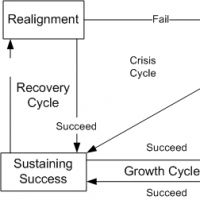Switching from Role-Based to Situation-Based Career Planning

New college graduates often face the dilemma of whether to join a start-up organization or an established brand.
Of course, the job market conditions do not always offer a choice, especially at the start of a career. But more often, people's problem-solving preferences begin to form early in their careers.
In most organizations, career planning in software development often stems from a role-based perspective, such as a management track or a technical track. While role-based career planning has worked for many, you can look at your career plans in another way—one that is situation-based.
In his book The First 90 Days, Michael Watkins talks about the evolution of business situations in a cycle referred to as the STARS model, which describes the four business situations as Startup, Turnaround, Realignment, and Sustaining Success. Watkins argues that businesses tend to move from one type of business situation to another.
Each of these situations is defined by its unique challenges. Startup situations require building structures and systems from scratch. Turnarounds are related to a gravely troubled business situation that demands high impact results in a short time and at lower costs. Realignment situations require revitalizing an organization headed toward slow failure. Sustaining Success situations require actions that ensure that the organization's competitive situation remains strong.
Handling each of these business situations requires a different perspective, a unique approach, and exclusive skills pertaining to the business situation. A Startup situation would require a software engineering professional (despite technical or managerial role) to have a tremendous sense of urgency and a willingness to forego set plans and take a different direction.
Turnarounds typically require embracing a difficult strategy in tough times and executing skills to perfection under intense time pressure. Realignment requires convincing yourself and others that the change is needed despite things currently working and displaying tremendous initiative to drive change. A Sustaining Success situation requires the skill to find a new peak when already performing at high levels.
If parallels are to be made with the current scenario, WhatsApp is a Startup; Blackberry is in need of a Turnaround; Microsoft can be considered undergoing Realignment; and Samsung is a Sustaining Success. Aligning your career by business situation does not mean jumping to any of these organizations mindlessly. The fact is that a career span will be more enriching if an employee sees merit in planning to contribute to most of these situations sometime in his career.
Consciously choosing to work in a business situation that is not aligned with your strong skills will certainly bring discomfort, but growth usually happens when you leave your comfort zone. Looking beyond the realm of their technical and managerial skills, software development professionals will be more situation aware, which is a key ingredient to success.
Do you agree?

